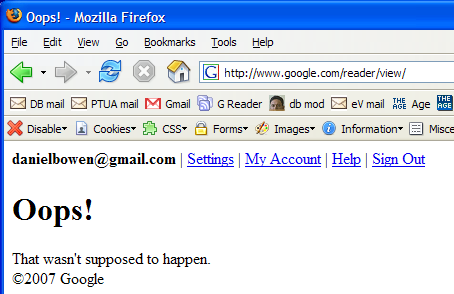Google Inc today lost a copyright fight launched by Belgian French-language newspapers which demanded the web search service remove their stories, claiming it infringed copyright laws. … They complained that the search engine’s “cached” links offered free access to archived articles that the papers usually sell on a subscription basis. It was unclear if Google would have to pay a fine.
— Wire story: Google loses case against Belgian papers
That’s just stupid. You don’t need to go around suing search engines to stop your stuff getting into their databases. Every web developer who knows anything about this knows you just need to drop a robots.txt file onto your web site and it stops all search engines and archivers stone dead.
To ignore that, and send the lawyers in instead just looks like you’re not looking for a solution, you’re looking for money.



